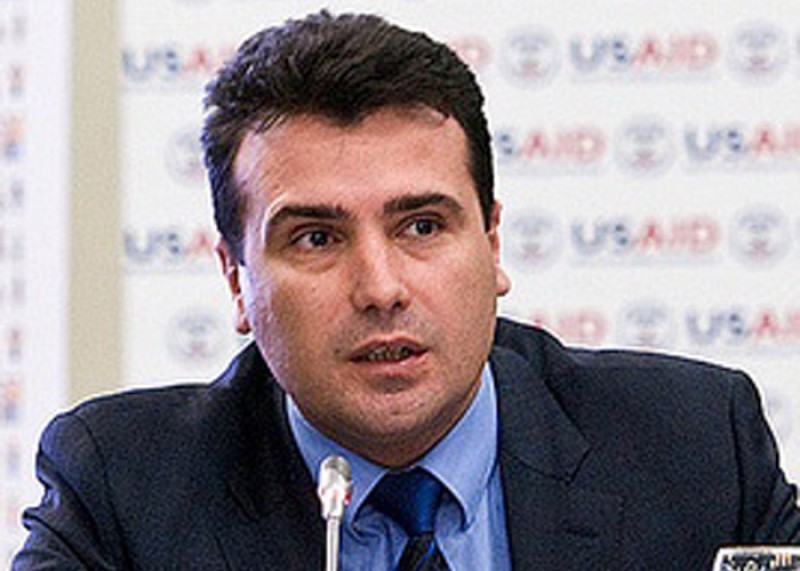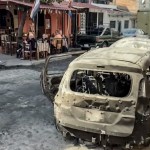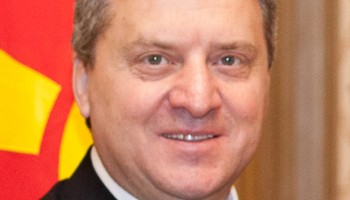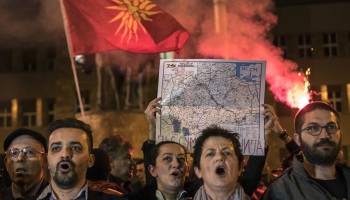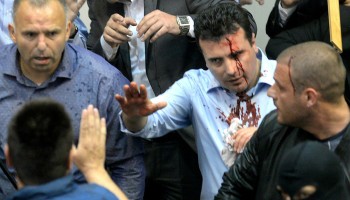These two wildly divergent versions of events have roiled the country in recent weeks. But since both sides refuse to provide evidence or even specific information about what exactly the bad guys are doing, it is impossible to know which narrative is true.
This week saw tensions rachet up as the leader of Macedonia's largest opposition party, Zoran Zaev, was arrested on suspicionof conspiring to overthrow the government with the help of an unnamed foreign intelligence service.
On the other side of the bitter row, Zaev's supporters accuse the ruling party, especially Prime Minister Nikola Gruevski, of attempting to bury as-yet-undisclosed information that could expose wrongdoing by the government.
Meanwhile, British, American and EU representatives have called for a full and transparent inquiry.
A dramatic press release released on Saturday Jan. 31 by Macedonia's Ministry of Internal Affairs announced that authorities were in the process of suppressing what they called a case of "endangerment of the constitutional order, and an attempt at undemocratic seizure of power for the first time after Macedonia's independence".
Authorities took away the passport of 40-year-old Zaev, who is leader of the Social Democratic Union of Macedonia (SDSM) party, and arrested three others they claim were involved in the alleged scheme.
Zaev, officials say, was in cahoots with the prime suspect, the former Macedonian secret service director, Zoran Verusevski, who is accused of spying and assisting the alleged coup. The remaining two are Verusevski's wife, Sonja Varusevski, and an official from the eastern municipality of Strumica, Branko Palifrov, who are both alleged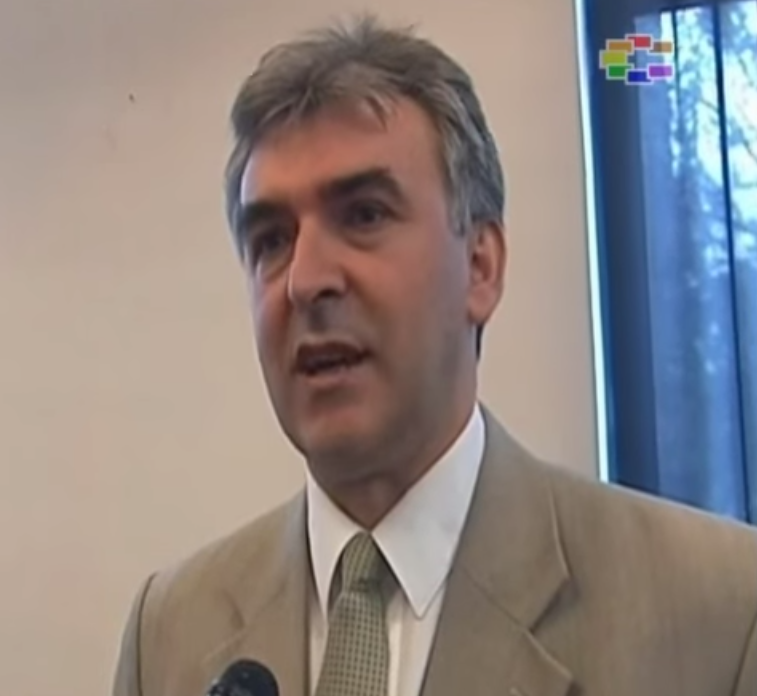 Zoran Verusevski to have helped Verusevski.
Zoran Verusevski to have helped Verusevski.
According to the Ministry of Internal Affairs, Verusevski secretly collected documents, photos and other data related to political, economic and security aspects of Macedonia, and tried to forward it to an organization or individual in a foreign country – although the ministry wouldn't say which country that is.
His wife, an employee of the Stopanska Banka in the capital of Skopje, allegedly used her office computer to translate the collected documentation into English. Zaev is thought to be accused of taking place in the plot by threatening to disseminate the information obtained by the other suspects through spying.
Macedonia has two major political parties: the ruling Internal Macedonian Revolutionary Organization–Democratic Party for Macedonian National Unity (VMRO), and SDSM.
During the disintegration of Yugoslavia in the 1990s, many former member states shifted from a socialist ideology to a notion of nationalist revival. VMRO, which supported separation from Yugoslavia, won the majority of seats in the first independent multi-party elections in 1990.
The opposing SDSM party is the successor to the League of Communists of Macedonia, which was in power during under the socialist regime of Yugoslavia until 1990. Since then, Macedonia has alternated between periods of dominance by VMRO and SDSM.
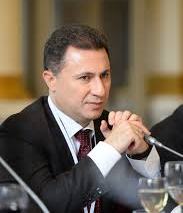 Nikola Gruevski
Nikola Gruevski
Prime Minister Nikola Gruevski, 44, leader of the VMRO, has held office since 2006. There was controversy surrounding his re-election in 2008. He was re-installed in a snap election after his coalition government collapsed, an event triggered after an invitation for Macedonia to join NATO was blocked by a veto from Greece. The decision to hold an early election was not supported by the SDSM, but it went ahead anyway.
Zaev's troubles began last year, when Gruevski accused him of trying to blackmail him into calling another snap election during meetings in September and November.
Authorities investigated the claims, and a police operation codenamed "Pooch" was initiated.
On Jan. 22,2015, the state prosecutor ordered a raid of former security chief Verusevski's private residence, seizing two handguns, four computers and six mobile phones. Four days later, on Jan. 26 police also seized the Stopanska Banka computer used by Verusevski's wife. Then, on Saturday Jan. 31, the Strumica private residence of Branka Palifrov was raided.
When authorities arrived, they found Verusevski's wife in Palifrov's home; she reportedly threw a mobile telephone out of the living room window. Three laptops, a computer and 20 mobile phones were seized by police.
While the first three suspects are now confined to detention for up to 30 days, Zaev was released after being ordered to return his passport. He denies the allegations, claiming authorities were trying to prevent him from revealing evidence of alleged nefarious dealings by Gruevski's government.
Zaev gave an interview in October last year to national channel TV24 News, claiming that he was in possession of proof of corruption and misuse of power at the highest levels which he said could lead to political destabilization and damage inter-ethnic relations in Macedonia. Following this interview, he gave numerous public statements to warn that, after revealing his findings, Gruevski's government would fall.
To date, he has not released any evidence to back up his claims, or even specified what exactly he is accusing the government of doing.
During a further speech in November 2014, he declared that: “My faith in the evidence and arguments thatprove that there is no freedom and democracy in Macedoniaare so high thatI am putting all mypolitical credibility and the credibility of the entire leadership of my party at stake. If we fail, thenI donot deserve to lead theopposition.”
The European Union, the British Embassy, and the US Embassy have issued public statements calling for a transparent investigation,urging the Macedonian government to respect the rule of law.
So what really happened? Without seeing Zaev's documents, it's hard to tell. Does he really have evidence of high-level corruptionIs it really a case of foreign interference in sovereign matters, as with Russian-linkedinterventions in Moldova? Or are the charges more reminiscent of Erdogan's Turkey- where the ruling party is accusing those who claim to possess proof of government wrongdoing of staging a coup?
Only a transparent and unbiased investigation can answer these and other questions. Meanwhile, Macedonia seems tied in knots.
This article was edited on March 30 to clarify the circumstances of Nikola Gruevski's election
